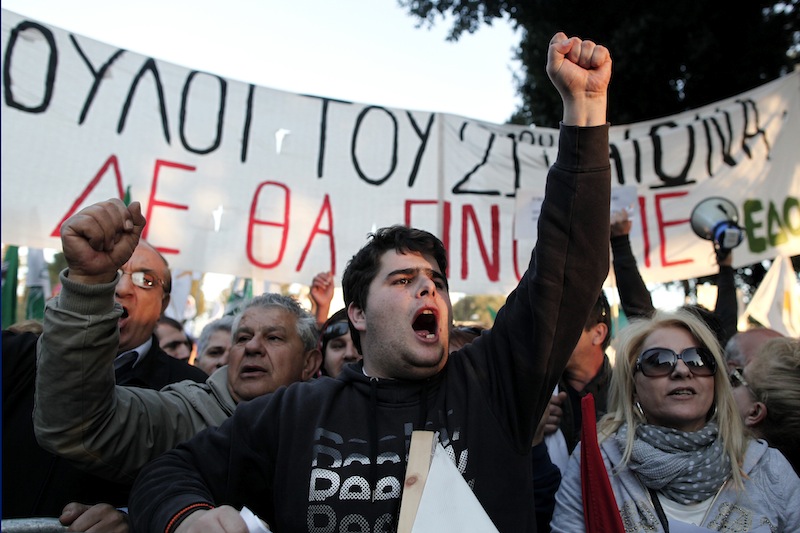NICOSIA, Cyprus (AP) — Cypriot officials rushed Wednesday to find new ways to stave off financial ruin, including asking Russia for help, after Parliament rejected a plan to contribute to the nation’s bailout package by seizing people’s bank savings.
Tuesday’s rejection of the plan to take a slice of all deposits above 20,000 euros ($25,888) has left the country’s bailout in question. Without the bailout, the Cypriot banking sector would collapse, devastating the economy and potentially causing the country to leave the euro.
That could roil global financial markets as well as endanger deposits in the country even further.
Political party leaders met at the central bank to discuss an alternative plan to raise the 5.8 billion euros ($7.5 billion) the country needs to qualify for 10 billion euros in rescue loans from its fellow euro countries and the International Monetary Fund.
They also discussed not raising the full 5.8 billion domestically, with the rest potentially coming from other sources, such as Russia. Cyprus’ finance minister was in Moscow to ask for support, possibly in the form of an extension on an existing loan.
“We will be here until some kind of agreement is reached,” said Michalis Sarris in Moscow.
Cypriot President Nicos Anastasiades held talks with European and IMF officials but issued no statement on the result. The eurozone and IMF officials must sign off on any Plan B the Cypriots come up with if it is to be approved as part of the bailout.
Anastasiades called a meeting of his cabinet ministers for later Wednesday. The ministers would likely draft a bill to limit the amount of money leaving the country, according to a banking official who spoke on condition of anonymity as they were not authorized to discuss the situation.
The ministers would also try to create a so-called “bad bank,” a fund in which the dump the nonperforming investments of the country’s two largest banks, which lost billions on bad Greek debt.
Cyprus is running on borrowed time, literally.
The ECB is keeping the Cypriot banks alive by allowing them to draw on emergency support from the local central bank. But the ECB has said it would cut off that aid if there was no bailout deal soon and it became clear the banks had no hope of becoming solvent again.
Under the initial bailout plan conceived in Brussels last weekend, other eurozone countries and the IMF would give Cyprus 10 billion euros ($12.9 billion) in rescue loans if the country raised 5.8 billion euros ($7.5 billion) through the one-off bank deposit seizures.
The plan was initially to take 6.75 percent of deposits up to 100,000 euros and 9.9 percent on those above that threshold. That caused outrage, leading the government to propose an amended version that would have spared deposits up to 20,000 euros. But that new plan also failed to win over Cypriot lawmakers.
The European Commission, the executive arm of the European Union that is involved in the bailout talks, said in a statement that it was Cypriot authorities that had wanted to extend the seizures to deposits below 100,000 euros.
But doing so would have required increasing the size of the confiscations on larger deposits, something Cyprus apparently refused to do. The government is worried about scaring away large depositors, who could put a strain on the island’s financial system if they were to pull their money out quickly.
The central bank’s deputy governor, Spyros Stavrinakis, said no decision had been taken on when banks, which have been shut since the weekend, would reopen, and that a new plan has not yet been presented to the country’s euro partners and IMF.
The banks remained shut for the third day running to avoid a bank run, and there are growing expectations they may not reopen until next week — certainly not until Cypriot authorities come up with a credible financial package.
In Nicosia, residents waited anxiously to see what lay in store for them.
Avetis Bahcecian has been running his Armenian restaurant in Nicosia for years. Now, with the uncertainty swirling around Cyprus, he’s worried about his business.
“Whatever they do, they have to do it quickly because this uncertainty is hurting business,” the 41-year-old said as he kneaded dough to make lahmacun, a traditional Armenian pizza-style food. “Our business is down by 40 percent in the last couple days.”
ATMs have been dispensing cash and debit and credit cards have been working, so Cypriots have not faced any immediate cash shortage for day-to-day living.
As uncertainty grew over the country’s future, even the country’s influential Orthodox church offered to help.
Its head, Archbishop Chrysostomos II, said the church was willing to mortgage its assets to invest in government bonds. The church has considerable wealth, including property, stakes in a bank and a brewery.
“The wealth of the church is at the disposal of the country,” Chrysostomos said.
___
David McHugh in Frankfurt, Germany, contributed to this report.
Copyright 2013 The Associated Press.






